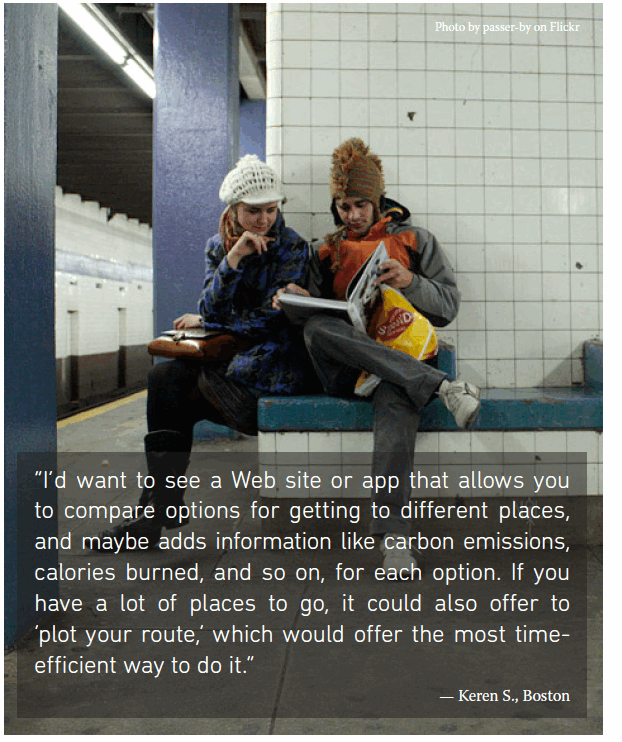LATITUDE & NEXT AMERICAN CITY
In late 2010, Latitudeº asked 18 participants (10 from Boston, 8 from San Francisco) not to use their cars for one week. The vast majority of participants had ranked cars as their most necessary form of transportation, with the remainder using their cars at least weekly.
During the study week, participants were permitted to use public transit, walk, bike, ride-share—anything but drive a vehicle.
They completed surveys about their attitudes and experiences prior to, during, and after the car-free week. They also contributed to online group discussions with other participants and chronicled their experiences photographically when possible. Participants were men and women ranging in age from 24-51. Approximately 3 in 4 participants owned smartphones.
OUR QUESTIONS
1. How can new technologies improve not only transit but also our larger experience of cities?
2. How can information access encourage people to make more sustainable transit choices?
3. Can tech help transit make us feel more connected to each other—and what lessons can businesses in other industries apply?
INFORMATION CAN EQUALIZE TRANSIT CHOICES
Autonomy Matters More than Ownership
More than two-thirds of participants cited convenience, control, and flexibility—not comfort or status, as the chief benefits of car ownership. After their car-free week, more than four-fifths felt car ownership was not essential, particularly if they could have access to car-sharing or ride-sharing services.
Improving Perceptions of Alternative Transit
Location-aware, on-the-go mobile access to alternative transit options (e.g., buses, bike-sharing) would allow for up-to-the-minute comparisons of means, routes, and costs—extending the choice and convenience otherwise limited to car ownership to car-free transit as well. As a result, such tools can help raise the profile of alternative transit modes, symmetrizing them with more conventional or better-accepted ways of getting around.
LOSE A CAR, GAIN A COMMUNITY
Rediscovering the Community—and Oneself
By a two-to-one margin, participants felt more integrated into their communities than they had expected to before the car-free week, and two-thirds found that new transit routes exposed them to new experiences, such as local events, public art projects, or previously unvisited shops and local businesses.
Individuals, Together
The personal value of shared offline situations—even everyday ones like riding the same subway car or walking the same sidewalk—can be enhanced by online tools, whether these tools are strictly informational (such as an app with details about events along a given route) or highly interactive (such as interactive digital displays in public spaces). Similar tools could even enrich otherwise isolating car rides.
Download summary (PDF): Tech for Transit
Read full report online (AmericanCity.org)
About Latitude
www.latd.com
“Latitude is an international research consultancy exploring how new information and communications technologies can enhance human experiences. Amidst a landscape of profound technological change, they consistently deliver next-generation insights and assist organizations in discovering and developing new opportunities.”
About Next American City
www.americancity.org
“Next American City is a 501(c)(3) nonprofit organization, dedicated to promoting socially and environmentally sustainable economic growth in America’s cities and examining how and why our built environment, economy, society and culture are changing. They achieve this goal through the publication of their quarterly magazine and interactive website, their emerging leaders program, events across the country, and advocacy on issues central to the future of cities.”
Tags: Boston, CA, California, Latitude, MA, Massachusetts, Next American City, San Francisco







 RSS Feed
RSS Feed